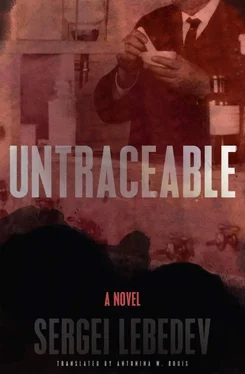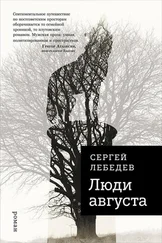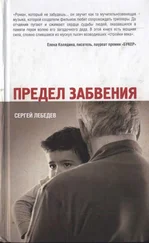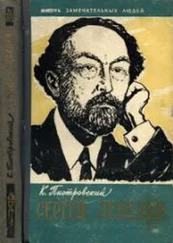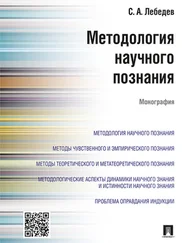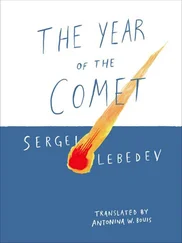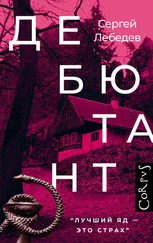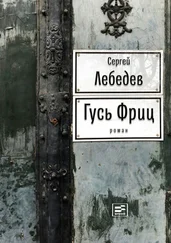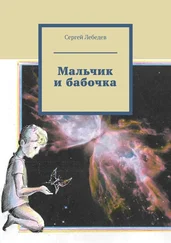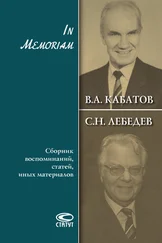Сергей Лебедев - Untraceable
Здесь есть возможность читать онлайн «Сергей Лебедев - Untraceable» весь текст электронной книги совершенно бесплатно (целиком полную версию без сокращений). В некоторых случаях можно слушать аудио, скачать через торрент в формате fb2 и присутствует краткое содержание. Город: New York, Год выпуска: 2021, ISBN: 2021, Издательство: New Vessel Press, Жанр: Современная проза, на английском языке. Описание произведения, (предисловие) а так же отзывы посетителей доступны на портале библиотеки ЛибКат.
- Название:Untraceable
- Автор:
- Издательство:New Vessel Press
- Жанр:
- Год:2021
- Город:New York
- ISBN:978-1-939931-90-0
- Рейтинг книги:3 / 5. Голосов: 1
-
Избранное:Добавить в избранное
- Отзывы:
-
Ваша оценка:
- 60
- 1
- 2
- 3
- 4
- 5
Untraceable: краткое содержание, описание и аннотация
Предлагаем к чтению аннотацию, описание, краткое содержание или предисловие (зависит от того, что написал сам автор книги «Untraceable»). Если вы не нашли необходимую информацию о книге — напишите в комментариях, мы постараемся отыскать её.
Untraceable — читать онлайн бесплатно полную книгу (весь текст) целиком
Ниже представлен текст книги, разбитый по страницам. Система сохранения места последней прочитанной страницы, позволяет с удобством читать онлайн бесплатно книгу «Untraceable», без необходимости каждый раз заново искать на чём Вы остановились. Поставьте закладку, и сможете в любой момент перейти на страницу, на которой закончили чтение.
Интервал:
Закладка:
Kalimullin pulled his machine gun off his shoulder, fired the obligatory shot in the air, and then aimed at something in the distance. As the lieutenant later recounted, at first he thought some people had gotten into the testing ground and were headed to the wire fencing. Someone with sense at the nearest watchtower turned on the projector and ran the spotlight over the karst sinkholes—it was getting dark, the technicians had spent a lot of time plugging in the compressors and making sure things were hermetically sealed—and in the bouncing light they saw five monkeys running to the fence, swaying, but—so it seemed to Kalitin and not only him—supporting one another, like wounded soldiers unwilling to surrender.
Kalitin understood at once. The soldiers—dolts, jackasses—had not checked the caves properly and had missed a crack. Or maybe the monkeys had dug themselves out, the land was friable, soft, the limestone washed away.
No one had made maps of the underground passages. They had measured by sight. And now tried to figure out where the fugitives were coming from: the cave where they were testing Kalitin’s substance, which was not contagious, or the cave full of the army’s poison—in which case the monkeys could be walking biological weapons. They hadn’t died yet, but that didn’t mean anything, the virus could be in their blood.
Kalimullin, good old Kalimullin, was already shooting in short bursts. One monkey fell, then another. They were having problems with the machine gun on the tower: it must have gotten stuck. The men who were armed took guns out of their holsters.
The fence was supposed to stop them, the barbed wire was high tension. But Kalitin sensed failure and realized something incredible would happen. Where the wire lay along the edge of a karst sinkhole, one monkey pushed another. It fell and burned in a violet flash. Two others slipped outside, as if they knew the short circuit would make the bottom row of the barbed wire safe.
Amazingly, no one panicked, Kalitin recalled, even though they all understood that they could lose not only their army and civilian rank, but their heads as well. The old general, who had taken Königsberg as a senior sergeant and had commanded a regiment in 1956 in Hungary, activated the closest garrison—allegedly for an unplanned training session. They used secret telephone lines to reach a zoologist in Moscow, the best specialist in primates. He didn’t understand the question at first—where will a monkey run to hide in the conditions of central Russia?—but then, after the general roared out a concise and useful description of the locale, the specialist commanded them somewhere unexpected: not into the woods but into the rushes, into the marshes.
So the wild hunt began. They were under the spell of primitive thirst for revenge. Motorboats rushed up and down the river, searchlights checking the river reaches, scaring off fishermen from favorite spots. Cars raced along the banks, twin beams of headlights bouncing, and helicopters buzzed overhead. Military trucks spread out in a wide arc, dropping off groups at intersections with instructions to canvass residents about anything unusual and moving out in search parties. The soldiers either joked or moved in silence, obeying the strange order: find and destroy a monkey, the reward a medal and ten days’ leave, and for privates—sergeant’s stripes.
Crackling voices and static came over the walkie-talkies. They had already driven away two fishermen. They wounded a thief stealing kolkhoz hay. Two trucks collided, six wounded.
Voices interrupted their communications: the police, the second secretary of the oblast party committee, even some bum from the fishery management office, who somehow got on the closed line—What’s going on?
The generals pressured them with their big stars, insisted on secrecy, sent them to the commander of the okrug for information. The helicopter shook, Kalitin wanted to throw up. They dragged him into the Mil copter, as if to demonstrate that they were all in the same boat. The pilots were just back from Afghanistan, the very mountains where the army planned to cleanse the caves, and now they were showing off, practically shaving the tops of trees with their propeller, hugging the dark water, sliding the belly along the craggy banks, and chasing an untended flock into the night—the fat white sheep scattered in every direction. The copilot laughed—he should have taken one for shashlik, but there was no time to land.
The airwaves whistled after midnight: got ’em. The copter dropped, making a U-turn, and howled as it accelerated. They landed, creating waves, on a stony spit. The soldiers ran into the night and using a waterproof sheet—another smart command—carried in a twisted body powdered with chlorine, as if with white snow. Strawberry pink spots of blood appeared on the chlorine. No gas masks, no protective gear, no time to put them on—only the desperate hope that the monkeys were from Kalitin’s cave, had sensed the stinking, powerful chemicals, huddled in a far corner and accidentally found a way to the surface.
Kalitin took the blood sample himself; a Mi-2 helicopter flew to the laboratory with it.
Then there was another flight, and Kalitin could no longer tell if he or the propellers were spinning. A signal from the other direction, thirty kilometers away. A spurt of the helicopter on its last liters of fuel. A heavy landing. A pale, hungover dawn. Lieutenant Kalimullin’s predatory, triumphant face. A long narrow break in the rushes, the slurp of smelly stagnant water, and there at the end, on broken reeds, a deformed monkey cut down by a long burst of bullets. The first one, the one that had led the others and had knocked one into the electric fence. It had almost made it through the last ring, but Kalimullin up on a cliff saw movement in the rushes and shot from afar, counting on luck rather than accuracy.
Kalitin barely held back the nausea. For a second he thought they had killed the ancestor of all humans. Kalimullin’s shooting had been guesswork, he couldn’t see what was in the rushes, ape or man, a stranded poacher, for instance.
The hunters stood quietly, drained. They cupped lit cigarettes in their hands, warming their chilled fingers.
Kalimullin recognized the monkey, a large combative male with a torn left ear. The male had been in the cave pumped with Kalitin’s chemicals. He thought that the ape must have swallowed some of the substance and it had worked; the bullets finished what the gas had begun.
No one celebrated the salvation, no one cursed out loud—dozens of armed men, exhausted by the night’s work.
The helicopter remained on the bank. They promised the pilots a tanker barge would come for them. They returned in Kalimullin’s open-top jeep. They tossed the dead animal wrapped in a tarp into the trunk.
The driver, worn out, drove carefully but still managed to hit potholes. Kalimullin frowned but said nothing. It was this sergeant who drove the car up the hill, reversed, and braked so that the lieutenant could fire his successful round. Next to Kalitin in the back seat dozed Kazarnovsky, senior scientific fellow of his laboratory.
Some time back, Zakharyevsky chose him to partner with Kalitin, but Kazarnovsky did not live up to expectations, he did what he was told, no more. Twice he had asked for a transfer, and the chief of security informed Kalitin that Kazarnovsky had twice made suspicious requests to the special section at the institute library for books that did not always entirely correspond to his research topic; for example, a foreign scientific encyclopedia volume requested by Kazarnovsky allegedly for its article on structural modeling also contained an article on Andrei Sakharov.
Actually, Kalitin was less bothered by Kazarnovsky’s halfhearted dissident behavior—he defended it to the security chief—than by his passivity. After all, their late patron Zakharyevsky was a very ambivalent ideological communist. There were times he said outright treasonable things, knowing that the room was probably monitored. But how Zakharyevsky worked! He was forgiven all for that, and that’s why Kalitin respected him so much; Kazarnovsky was a wimp.
Читать дальшеИнтервал:
Закладка:
Похожие книги на «Untraceable»
Представляем Вашему вниманию похожие книги на «Untraceable» списком для выбора. Мы отобрали схожую по названию и смыслу литературу в надежде предоставить читателям больше вариантов отыскать новые, интересные, ещё непрочитанные произведения.
Обсуждение, отзывы о книге «Untraceable» и просто собственные мнения читателей. Оставьте ваши комментарии, напишите, что Вы думаете о произведении, его смысле или главных героях. Укажите что конкретно понравилось, а что нет, и почему Вы так считаете.
